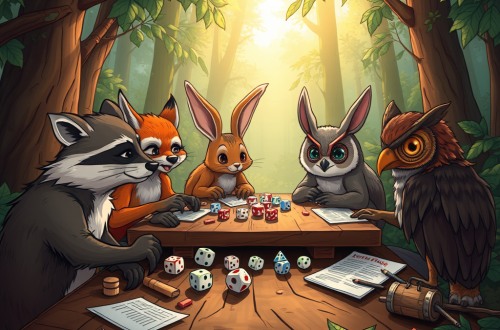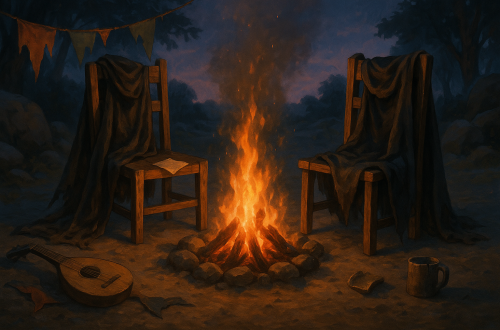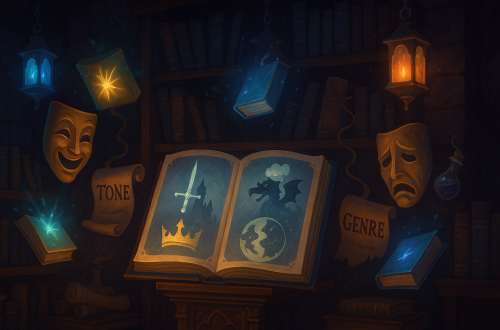Boundaries and Burnout for GMs
You tell yourself it’s not a big deal.
Someone talked over a quieter player again. Someone else made a joke that didn’t quite land, and the whole table went quiet for a second too long. Then someone corrected you mid-scene, like they were doing you a favour.
You smile. You move on. You patch it up.
Because you’re the GM. It’s your job to keep things moving, to keep people engaged, to make sure everyone’s having fun. You’re the one who keeps the ship steady, even when the waves get weird.
But somewhere under the surface, something starts to wear thin.
It’s not dramatic. There’s no explosion. Just a quiet unraveling, like a little dread before the session starts, a flicker of relief when someone cancels, a slow loss of excitement for the parts of the game you used to love most.
And if any of that sounds familiar, I want to offer you a simple thought that might feel a little radical:
Kindness doesn’t have to mean always giving ground.
Setting a boundary isn’t harsh. It isn’t mean. In fact, it might be the kindest thing you do: not just for yourself, but for the group.
Why It’s So Hard to Speak Up at the Table
If we’re being honest, we’d admit that most of us let small stuff go. Maybe someone’s just excited, and they didn’t mean to interrupt. Maybe they don’t realize how often they take the spotlight, or how their “helpful” rules reminders land like criticism. It’s easier to shrug and move on than to stop the whole game over it.
And we do it for good reasons. We don’t want to be rude. We want people to have fun. We don’t want to seem overly sensitive or bossy. It’s easier to laugh it off than make things awkward.
But when we keep letting it slide, those small moments stack up. A couple of players end up steering the whole game, while others fade into the background. Someone’s having a great time, maybe even thinks everything’s going great, while someone else is quietly checking out.
Eventually, it starts to feel like the game isn’t for everyone anymore. Including you.
Why Setting Boundaries Makes You a Better GM
It’s easy to feel like speaking up means starting a fight, or being “that GM” who ruins the fun. But boundaries aren’t about control. They’re about fairness and care.
They protect the space you’ve all built together. They keep it safe and fun and equal, not just for the most confident voices, but for everyone. Including the GM.
And yes, it might feel awkward at first. It probably will, even! You might worry about hurting someone’s feelings. But naming a dynamic isn’t a rejection, or a personal attack. It’s an invitation to do better together.
Not everyone will love it, and some people might push back. That doesn’t mean you’re wrong.
Sometimes the people who react the most to a boundary are the ones who need it the most.
How to Start Setting Boundaries
Honestly? Just start small.
You don’t have to sit everyone down for a big talk or write a whole rulebook of etiquette for the table. Most of the time, a boundary can sound as simple as: “Hey, let’s make sure everyone gets a turn,” or “I want to hear what Alex was saying.”
If someone keeps taking over, pull them aside privately and ask what they’re hoping to get out of the game. You might be surprised – sometimes people overstep because they’re trying to help, or they’re nervous, or they just didn’t realize how they were coming across.
You can check in with the group, too. Casual questions like “How are folks feeling about the pace?” or “Would it help to structure scenes a little more?” can give you an idea of how things are landing.
And when things get chaotic, you can lean on the game itself. “Let’s go around the table for this scene.” “Everyone gets one action before the tavern closes.” “Hey, what’s your character up to right now?” These are light touches that help keep the story moving without steamrolling anyone.
You’re not clamping down, you’re just making room. The more you practice it, the easier it gets. And the more your players get used to it, the more it becomes just… how the game works.
Session Zero is a great time to set out boundaries, if you haven’t started your game yet.
You Deserve a Game That Feels Good, Too
It’s easy to think that being a good GM means being endlessly accommodating. That your job is to absorb the friction, smooth the edges, and never make anyone uncomfortable. But running a game is not the same as running yourself ragged.
You deserve to feel excited about your own table. You deserve to tell the stories that light you up. And you deserve a group that respects the space you’ve created. Not just the map and the lore, but the people at the table, too.
Boundaries aren’t a barrier to fun. They’re what let everyone show up fully, safely, and honestly. They don’t kill the vibe, they protect it.
And if that still feels hard to say out loud, start with this:
“This game matters to me. I want it to work for all of us, including me.”
That’s not harsh, and it’s not overstepping.
That’s just the truth. And it’s enough.




